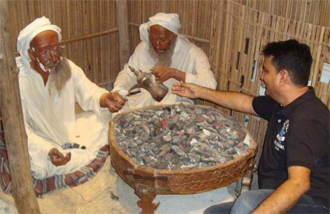Ajman, May 28: An Indian expat in Ajman has recalled his first Ramadan in the country when he would have just dates and water for Iftar, followed by a long journey on foot from his workplace in Sharjah to his home in Ajman.
 Syed Ali Maqsood, 51, moved to Ajman in 1990 from Hyderabad. Those were the days when Maqsood wasn't very well off. Today, he has four kids and they all indulge in large bowls of biryani to break their fast. "I used to work under my elder brother who owned a photo studio in Sharjah, near the cricket stadium at that time. Suhoor used to be very humble back then. We used to have roti and milk every suhoor, as well as a curry, another delicacy, which would be a thing of luxury," he said.
Syed Ali Maqsood, 51, moved to Ajman in 1990 from Hyderabad. Those were the days when Maqsood wasn't very well off. Today, he has four kids and they all indulge in large bowls of biryani to break their fast. "I used to work under my elder brother who owned a photo studio in Sharjah, near the cricket stadium at that time. Suhoor used to be very humble back then. We used to have roti and milk every suhoor, as well as a curry, another delicacy, which would be a thing of luxury," he said.
"My wife was expecting our second child then. We lived in Ajman and my typical day during this time was very 'historical', rather than calling it struggle.
"After Suhoor, I would start my day at 7am, when my brother would drive me to the studio from Ajman. Later in the evening, I would break my fast with only a bottle of water and few dates and start my journey on foot to home all the way to Ajman, Rashidiya. I still remember the sweatiness and cramps from the first Ramadan I spent and this went on for a year."
Maqsood said that back then, a particular home in every district of Ajman would be elected to cool food in large quantities to serve their community.
When Maqsood would get home from work, his wife had a proper dinner prepared for the family. "Fruits and sherbet was the usual Iftar followed by dinner. Our financial condition was erratic, it would be high some few months and low during others," he said. "Now by the grace of Allah, I have four children all grown up and healthy and my every Suhoor and Iftar is filled with so much blessings and choices. This is very much a dream that I never thought I would living as such a blessed reality. I am very thankful for what I have gained from this country by the grace of Almighty."
Today, Maqsood and his four children still reside in Ajman, except, now they have fuller meals for Iftar.





Comments
Add new comment